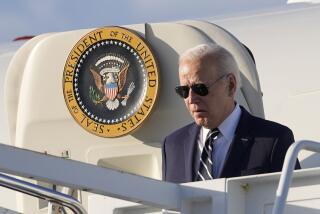Iraqi prime minister caught between U.S. and Iran
Iraqi Prime Minister Haider Abadi found himself caught between his government’s two most important allies - the United States and Iran - during his four day-visit in Washington.
Abadi’s trip was intended to shore up U.S. military support for the battle against Islamic State. He wants to speed up delivery of U.S. fighter jets, small drone aircraft and heavy weapons, and bring home financial aid to help rebuild Tikrit and other Iraqi cities devastated in the conflict.
But Abadi repeatedly was asked about the role of dozens of Iranian military advisors on the front lines, including a senior commander who helped direct lethal attacks on American troops during the U.S. occupation in Iraq.
Speaking Thursday at a Washington think tank, Abadi said he did not approve of widely circulated photos that showed Maj. Gen. Qassem Suleimani, commander of the Quds Force, an elite unit in Iran’s Revolutionary Guard Corps, supposedly drinking tea outside Tikrit at the start of a recent offensive.
“Certainly, it is a bad idea” for Iranian officers to appear to be commanding troops inside Iraq, Abadi said. “We don’t accept it.”
After Iraqi security forces and Shiite Muslim volunteer militias pushed the militants out of Tikrit, online photos showed Persian graffiti on the city’s walls along with photographs of Iran’s supreme leader, Ayatollah Ali Khamenei.
Abadi said the displays probably were intended to goad the Obama administration, which is conducting airstrikes against Islamic State positions but has not sent ground troops, and did not reflect Iranian control over Iraqi forces.
He expressed frustration, noting, “I’ve been talking to the Iranians about this.” He spoke at the nonpartisan Center for Strategic and International Studies.
Military assistance from Iran must be channeled through the central government, he said.
Iran has played an increasing role in neighboring Iraq since the U.S.-led invasion in 2003 ousted Saddam Hussein, a secular strongman who had led a disastrous war against Iran in the 1980s. The U.S. considers Iran a malign force, however, that has stoked sectarian tension in Iraq.
Yet the two longtime adversaries are tacit allies in Iraq because they are both backing Baghdad’s attempts to oust Islamic State. Washington and Tehran insist they don’t have and don’t want any formal cooperation.
Human rights organizations say the Iran-backed Shiite militias have been responsible for reprisal killings and destruction of Sunni homes in Tikrit and other towns wrested from Islamic State control.
In stark contrast to his predecessor, Nouri Maliki, Abadi has publicly embraced U.S. assistance in Iraq. During his first formal visit here, he repeatedly thanked Americans for their sacrifice and support in Iraq.
Abadi, who took office in September, is eager to keep on good terms with Washington and Tehran. Iran has trained and armed the Shiite militias that have so far been some of the most effective forces against Islamic State.
U.S. advisors, meanwhile, are helping create nine new Iraqi brigades that will be used in an attempt to recapture Mosul, which Islamic State has declared the capital of an Islamic caliphate.
In addition to seeking new heavy weapons and armored personnel carriers, Abadi wants the Pentagon to help shorten the time it takes to launch an airstrike after intelligence about a potential target has come in.
That could mean putting U.S. targeters closer to the front lines, a prospect that the White House has resisted.
Twitter: @ByBrianBennett
More to Read
Start your day right
Sign up for Essential California for news, features and recommendations from the L.A. Times and beyond in your inbox six days a week.
You may occasionally receive promotional content from the Los Angeles Times.







